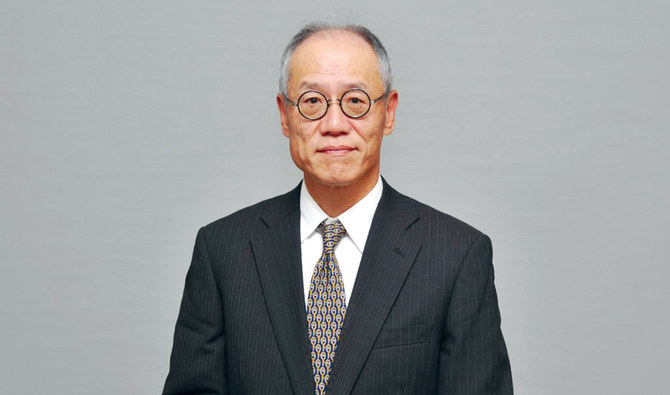TOKYO: Fumio Iwai, Japan’s recently appointed ambassador to Saudi Arabia, has a long history of service in the Middle East and says he is looking forward to returning to the region and the Kingdom.
“As an Arabic speaker, I have long worked in the countries of the Middle East and served at the Japanese Embassy in Riyadh from 2008 to 2011,” he told Arab News Japan.
“It’s been about 10 years since my last service in KSA and I’m looking forward to feeling and experiencing the recent changes and developments in Saudi society.”
“Although Japan and KSA are geographically far from each other and have different religious beliefs, I feel that our cultural backgrounds are similar, in a way that both countries have developed their societies through the fusion of tradition and modernity.”
Iwai said that he believes that the people of Saudi Arabia and Japan have an affinity with the Japanese concept of kaizen, the desire to improve oneself and one’s circumstances.
He pointed to how Saudi students clean their classrooms like Japanese students.
After visits to Japan by Crown Prince Mohammed bin Salman in September 2016 and King Salman in March 2017, the “Japan-KSA Vision 2030” was launched as a way of strengthening ties between the two countries.
“It is important for the people of both countries to deepen their understanding of each other,” Iwai said, noting how projects in which the two countries are cooperating have increased from 31 to 81.
I would like to pay my respect to the efforts KSA has made toward the AlUla agreement, which was signed at the last GCC Summit.
Fumio Iwai, Japan’s ambassador to Saudi Arabia
He also pointed to ventures such as the development of a demonstration project of an energy-saving seawater desalination system; the “Saudi Anime Expo;” and the signing a memorandum of understanding for the establishment of the Mohammed bin Salman Future Science and Technology Center between the University of Tokyo and the Misk Foundation.
“It is encouraging that our bilateral cooperation has recently become wider and deeper, and as a bridge between Japan and KSA I will aim to advertise the attractiveness of both countries and further strengthen the cooperation framework,” the ambassador said.
“I will do my best to realize Japanese contribution to KSA’s important national development projects, such as the NEOM development plan including ‘The Line,’ which was recently announced by HRH Crown Prince Mohammed.”
Japan imports about 40 percent of its crude oil from the Kingdom, so the peace and stability of Saudi Arabia and the Middle East are directly linked to Japan’s security.
“The stable supply of crude oil from KSA is crucial for Japan’s stability and prosperity,” Iwai said.
“The Japanese people are deeply grateful for that, but I am also pleased that both of our countries are promoting cooperation in various new fields beyond the trade in oil.”
Both countries are proceeding with the world’s first blue ammonia supply chain demonstration test using natural gas to build a sustainable carbon cycle economy (CCE). In the medical field, Japanese universities have accepted doctors from KSA for training.
The ambassador also noted how Saudi Arabia’s influence is growing.
“My impression is that KSA is a major power in the Arab and Islamic regions with the Two Holy Mosques and has an influence on the international community as a member of the G20,” he said.
“I would like to express my respect to KSA for the successful G20 Riyadh Summit,” the envoy said.
“It is essential for the international community to cooperate in order to tackle the global spread of COVID-19. Japan, responding to the initiative of His Majesty King Salman, has been working on strengthening the health and medical system in developing countries and on ensuring their fair access to vaccines. This includes providing ODA amounting to around $122 million to the Middle East and North Africa regions.” Iwai also highlighted the Kingdom’s development of tourism.
Iwai praised Saudi Arabia for the AlUla Declaration restoring peaceful relations with its neighbor Qatar.
“I would like to pay my respect to the efforts KSA has made toward the AlUla agreement, which was signed at the last GCC Summit,” Iwai said.
“I sincerely hope that good relations among the Gulf countries will be further promoted and that a good environment will be created so that a number of Japanese people who are interested in KSA and the Middle East can visit the region with peace in mind.”




























